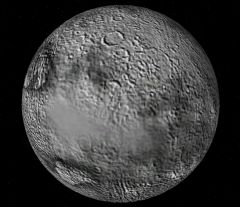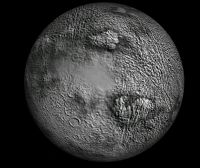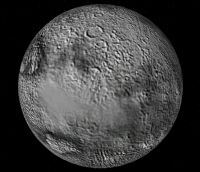1 Ceres
| 1 Ceres | |
|---|---|

| |
| Designation | |
| Name | 1 Ceres |
| Reference body | Sun |
| Planetary mean orbits | |
| Epoch | 2002.345 |
| Semimajor axis (a) | 413 849 369 188 m |
| Eccentricity (e) | 0.079115824 |
| Inclination (i) | 10.58° (0.184655835 radian) |
| Longitude of the ascending node (LAN, ☊) | 80.48629652° (1.404750877 radian) |
| Longitude of periapsis (ϖ) | 154.4707798° (2.696023706 radian) |
| Mean longitude (L) | 343.7459034° (5.999497805 radian) |
| Selected physical parameters | |
| Mean radius | 473000 km |
| Mass | 8.7×1020 kg |
| Rotation elements | |
| SidRotPeriod | 32670 seconds (9.075 hours) |
| SidRotOffset | 0 |
| Obliqutiy | 0.174532925 |
| LAN | 0 |
| Note | *Elements given are from 1 Ceres.cfg (AsteroidPack_v1.00.zip) |
1 Ceres was discovered on 1 January 1801 by Giuseppe Piazzi, and was at first classified as a planet, at least until it was realized that there are many small bodies in the area between Mars and Jupiter, at which time they were reclassified as asteroids, and now is classified as a dwarf planet. Ceres is the largest body and the only Dwarf planet in the main asteroid belt.
1 Ceres in Orbiter
1 Ceres was first introduced with the release of MainBeltAsteroids051403.zip in May 2003. Note that the landing surface as given in the config file is spherical, but the visual of Ceres is not, if you land, you will likely be above or below the visual surface.
| Add-on | Source | Version | Author | Type | Release Date | Compatibility | Wiki article |
|---|---|---|---|---|---|---|---|
| Asteroid Pack 1.00 | O-F Resources | 2004-11-21 | Nighthawke | Scenery | 21 November 2004 | ||
| Main Belt Asteroids v1.0 | O-F Resources | v1.0 | Unknown OHM Addon Developer | Scenery | 14 May 2003 | ||
See also
Gallery
- Image of Ceres from the Dawn spacecraft on 4 May 2015.
| edit The Solar System | |
|---|---|
| Central star |
Sun (Sol) |
| Planets |
Mercury - Venus - Earth - Mars - Jupiter - Saturn - Uranus - Neptune |
| Natural satellites |
Moon - Phobos - Deimos - Io - Europa - Ganymede - Titan - more... |
| Add-ons |
Planets - Dwarf Planets - Small objects - Natural satellites - Alternative star systems |



